Full of online programs! “IAfP” which connects Africa and Japan has started!!
TUFS Featured
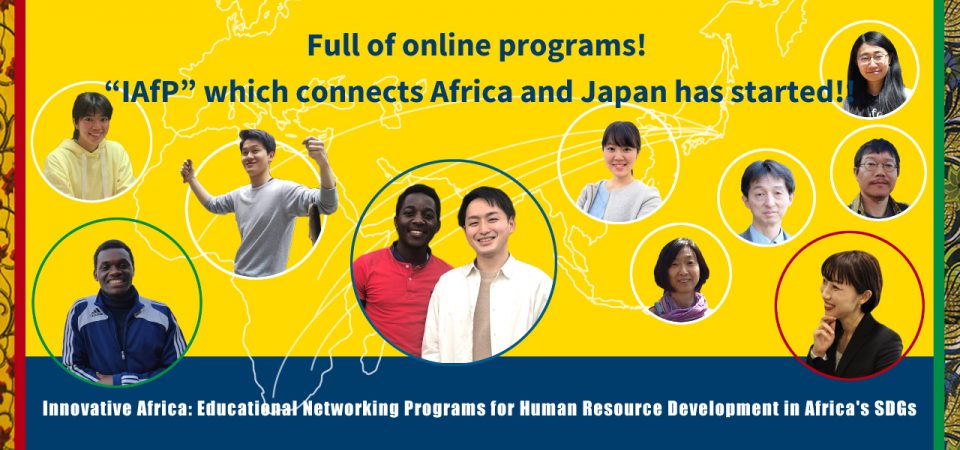
Have you heard of the IAfP, the “Inter-University Exchange Project (Africa)” that started last year? This program, which was adopted and launched under the COVID-19 pandemic, focuses not only on the face-to-face exchange of students to the partner African universities, but also on online “education and exchange programs”.
The specific name of the project “IAfP” stands for “Innovative Africa: Educational Networking Programs for Human Resource Development in Africa’s SDGs”. The IAfP was adopted in 2020 as an “Inter-University Exchange Project: Support for the Formation of Collaborative Programs with African Universities” by MEXT.
This article will introduce the IAfP by interviews and comments with the IAfP coordinator, students who participated in last year’s online programs, and the professors involved in the IAfP!
Interview with the IAfP coordinator KUMASHIRO Chihiro, the assistant professor
——Please tell us what is IAfP.
In this program, we collaborate with five African partner universities (below) with which TUFS has MOU, and exchange students by physical traveling and conduct exchange programs on online. The purpose of this project is to train and nurture individuals who can lead the realization of technological and social innovations in Africa. This program, which will run until 2024, will be implemented in cooperation with Kyoto University, a Japanese partner university. But specific programs will be planned individually. At our university, we are working together with the professors related to Africa (comments below) and the staffs in charge of IAfP at the Office for International Affairs and share ideas to conduct the programs.
African Partner Universities
- University of Ghana (Ghana)
- Protestant Institute of Arts and Social Sciences (Rwanda)
- University of Zambia (Zambia)
- University of Pretoria (South Africa)
- Stellenbosch University (South Africa)
——I heard that you have done the Japanese classes, online tours and “Joint Conference” as the IAfP exchange programs at TUFS last year. Please tell us about the Japanese classes first.
Japanese classes were organized with the collaboration of Peace and Conflict Studies Program (PCS), with the cooperation of Rie Ishida, the coordinator of the PCS. Every year, the PCS provides practical classes called “Survival Japanese”. In the class, students learn Japanese necessary for their daily lives. This time, under the concept of “second step” of the Survival Japanese, we started the intensive Japanese classes as the program of the IAfP from following day of the PCS’s “first step” ended on early February,
In addition to studying Japanese, this class was intended to be an opportunity to interact with TUFS students for the international students. Therefore, we recruited Japanese native students and held beginner and intermediate classes for three days (18th, 19th and 25th February) with the six volunteer students who came to help with conversation practice.
(report).
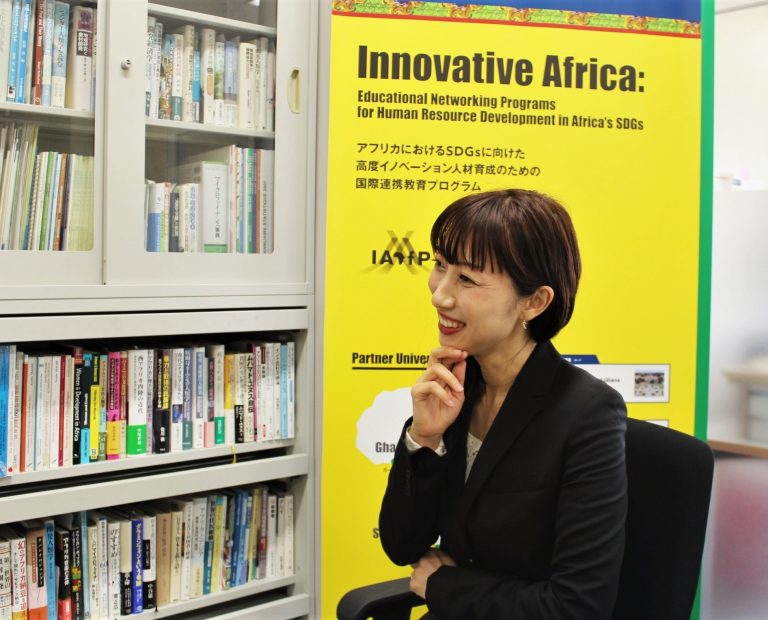

——You told me the other day that the Japanese Classes were the first program to be conducted by the IAfP. Since it was your first time, I guess you had some difficulties, didn’t you?
I was very nervous as this was not only the first program for IAfP but also my first program since I joined TUFS in February. But thanks to the supports of PCS coordinator Ishida and the class lecturer En (PhD candidate, comments below), we were able to prepare the classes smoothly in a short period of time. I was happy when the students actually gathered online. I also felt that the project has actually started to move.
The lecturer En taught the PCS survival Japanese last year, so she was very experienced, and she managed the classes with flexible ideas and controlled the situation even in trouble.
Comment from the lecturer of the Japanese Classes En Syu
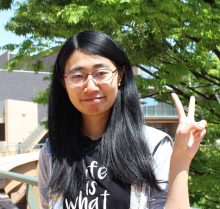
Institute of Global Studies, Japan Studies, 3th year of Doctoral Program Student
I was very happy to teach the Japanese classes of IAfP. At first, I was nervous and worried, but I was reassured after the meetings with assistant prof. Kumashiro, who is the coordinator of IAfP. The students were studious, and even though the Japanese they could use was limited, they certainly showed their willingness and ability to communicate. I think I was able to finish the class successfully with the support of the students. I was deeply touched to see the students practicing conversation with Japanese students and trying to convey what they wanted to say to the best of their ability. It was a short time, but I hope that it will be useful for their future.
——After the Japanese classes, you have conducted the online tours, right?
Yes, we conducted three online tours: Hiroshima (5th March), Meditation (9th March), and Okinawa (18th March). When I talked with an international student, I heard that he spends all his time: eating, taking classes and his free time in his room except for going shopping once a week. So we planned the online tours in order to create opportunities to let international students know about Japan and promote exchange with TUFS students. Many PCS students also participated in the online tours because the tours were just after finishing the Japanese classes and I was happy about that.
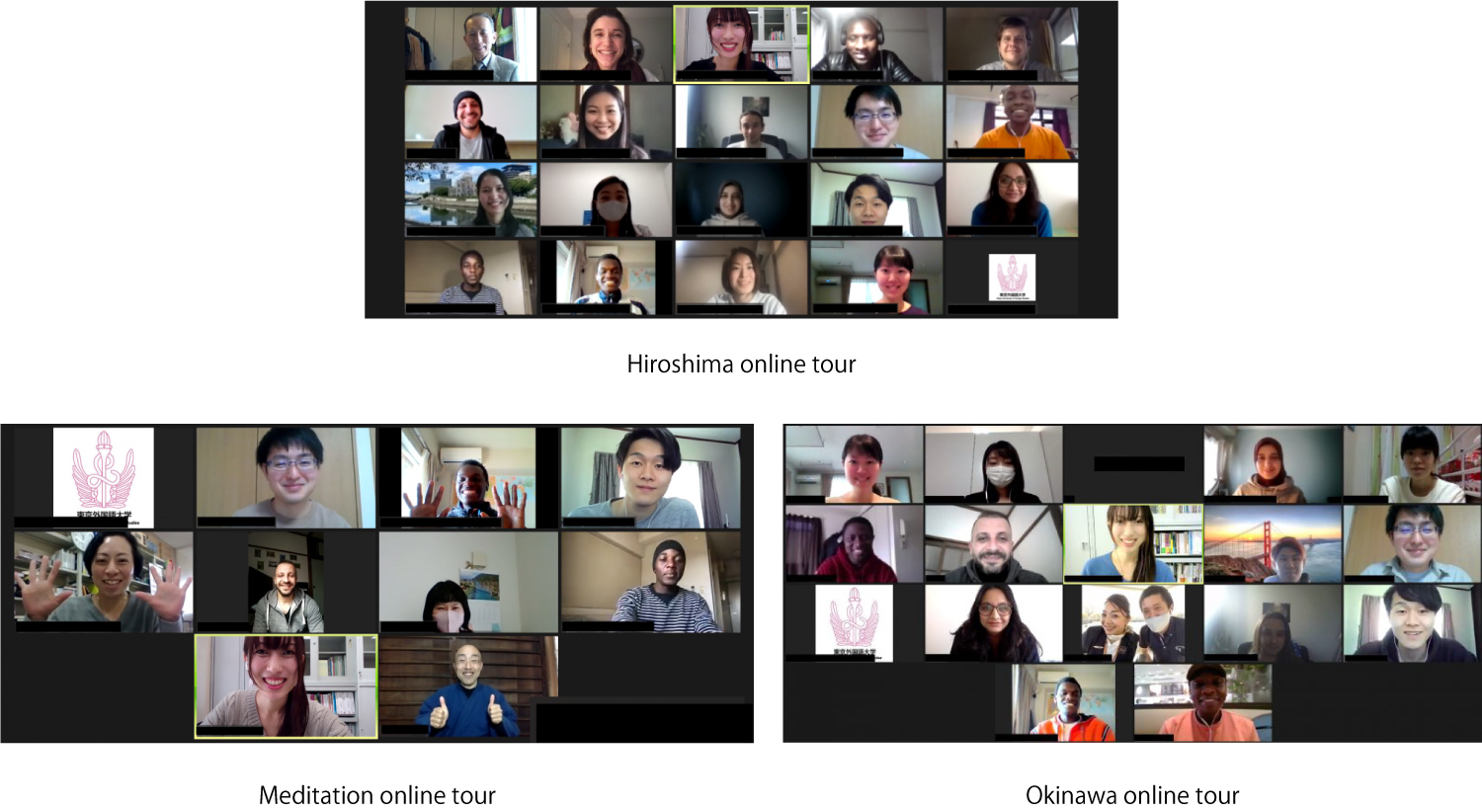
——Then, I heard that you have established a working group for the online tours.
As I mentioned, one of the purposes of the online tours was to promote interaction, so I wanted to set up a discussion time after the tour. I recruited the members of the working group in order to incorporate students’ opinions in the online tours, such as in the content of discussions and the tour selection. At first I was worried about whether it would work or not because there were fewer students gathered than I had expected. But the three students who participated in the working group (interviews and a comment below.) were very reliable and we were able to exchange opinions actively in a small group. So now I think it was the best number for us.
All the meetings of the working group were held online. At the first meeting, the students participated from three different places, from his home, from the bench in a park, and from the car seat in the parking lot. I felt like it refers to our new normal of nowadays and was very impressive. It was a shame that we couldn’t have a face-to-face meeting, but I guess students could join the working group on a busy schedule because it was online.
——Do you have any thoughts or impressions from online tours?
It’s embarrassing to say but in the Japanese class which was held before the online tours, I had a chance to reconsider about my mental attitude in casual conversation. An international student asked me “What movie did you watch recently?” and I talked about a movie whose theme was the history of war. The student who had experienced conflict commented, “War is not history. I don’t want to think about war even in the movies”. Since some of the participants of the online tours were from countries where conflicts are ongoing and post-conflict countries, we had discussed in the working group in advance that we try not to put a mental load on the participants as much as possible during the war-themed Hiroshima and Okinawa tours. We tried to be careful, but there was a thing we could not handle well, which are valuable lessons for the future programs.
During the Hiroshima tour, we had an opportunity to hear the story from an atomic bomb survivor and ask questions directly. I was touched with what an international student said at the end of the tour. The student said, “I didn’t want to talk about my experience of the conflict, but now I feel like to start thinking to talk about it”. The student was moved by the lecture and the words of the atomic bomb survivor, “If I don’t tell the story, then who?”. It was a very impressive and unforgettable experience to be able to share the moment when someone’s mind has started to change. I hope we can share such moments as much as possible through future IAfP programs.
——What kind of online programs are you planning this year?
There are three main types of the online programs. (1) Programs for international students from Africa (“accepting students”), (2) programs for TUFS students (“sending students”) and (3) Joint Conference.
Actually, Japanese classes and online tours last year firstly targeted on international students. TUFS students were second target. For international students, we plan to hold the Japanese classes and online tours again this year. But we plan to invite students from African partner universities in online tours. As we conducted last year, we would like to make them as the opportunities to interact with TUFS students, so we look forward to your active participation!
About the programs firstly target on TUFS students, this is actually the first year to conduct them so we are still under consideration. For example, we are planning to invite professors from African partner universities to the seminars (presentation of a graduation theses) of the IAfP related professors continuously for academic exchange. Apart from that, I would like to plan an Africa study tour in the near future.
——What is the Joint Conference?
To put it simply, Joint Conference is a one-shot event of academic exchange held with African partner universities. Sometimes Kyoto University, which is the Japanese partner university, joins as well. The conference will be held online in the case of coronavirus.
Last year we held an online conference “Past and Future of Exchange Programs in Africa of TUFS: IAfP Kick-off Joint Conference”. Five African partner universities introduce their universities and then the TUFS students who have been to African partner universities and African students who have come to TUFS shared their experiences (report on TUFS website, report on IAfP website).Upon holding this event, we edited a booklet of the study abroad experiences that Professor Oishi had posted on the website of the Department of African Area Studies.
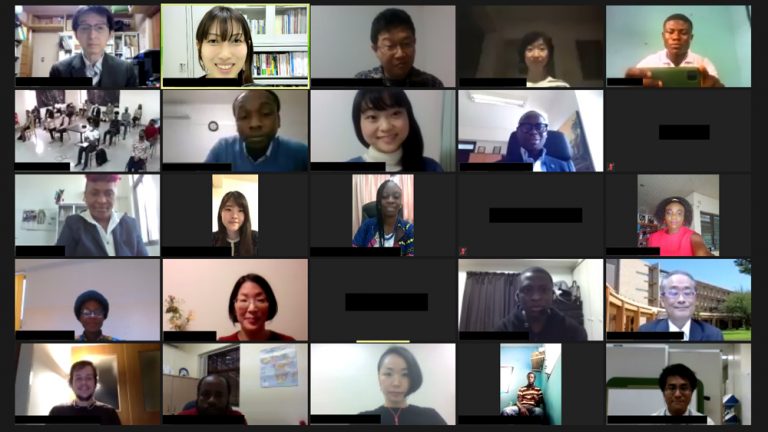

This year, we are planning a Joint Conference in collaboration with the 5th Anniversary symposium of the African Studies Center, as well as a conference for academic presentations by undergraduate and graduate students from TUFS and African partner universities.
——Is there any classes related to IAfP?
In the spring semester, there is a class for dispatched students called “Infectious Diseases and Tropical Medicine,” by Professor HARUKI Kosuke(Dokkyo Medical University, Saitama Medical Center). In this class, students can learn about disease prevention and infectious diseases that are necessary for fieldwork. This knowledge is important to protect yourself, so I hope the students will take advantage of this class.
In the fall semester, we will be offering a relay lecture entitled “Connect with Africa”, which will be given by professors in Africa. This is a rare opportunity to learn directly from African professors so I hope many students will take it. I will be coordinating the class, and I would like to arrange the class easier to learn for the students who will be learning about Africa for the first time.
Here in TUFS, there are many classes on Africa hold by the professors with diverse backgrounds, so I hope that those who are interested in Africa will actively participate in these classes. I am also teaching a class called “Africa and Fieldwork” in the Global Liberal Arts Program in the spring semester, so if there are any students who are interested, you are welcome to attend.
——Finally, could you please give us a message to the students.
As it is a difficult time for us to travel to Africa due to the coronavirus, I would like to enrich the online programs and provide opportunities for students to learn about Africa and interact with African people. If you have any suggestions on what you would like to do through the IAfP, please let me know. Let’s make it come true together! We will advertised about the information such as online programs on the website of IAfP, so please check it occasionally. We are looking forward to your participation!
In this special issue, I have focused on the online programs, but we will also provide support for actual traveling to Africa. I have also conducted fieldworks in Burkina Faso in West Africa, so if you are interested in going to Africa, chatting about Africa or meeting the students from Africa, please feel free to visit our office anytime.
——Thank you very much. I encourage everyone to experience Africa by participating in such as online programs of the IAfP!
Interviews with the students who participated in the Online Programs
Below are the interviews conducted by the Assistant Professor Kumashiro, the project coordinator, with the students who participated in the online programs last year, and the comments from the students.
Henri Fabrice Ndayizeye
From Protestant Institute of Arts and Social Sciences (Rwanda), Staying until July 2021
Participated in Japanese class, Online Tours (Hiroshima, Meditation, Okinawa) and Joint Conference
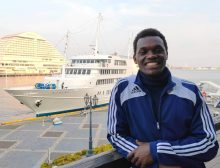
——How was Japanese class? We aim the class to be an opportunity not only to learn Japanese but also to interact with TUFS students. Did it work as we aim?
The class was inclusive for both learning and connecting with friends. It was obvious a totally international class that comprise Japanese and international students from Burundi, Syria, Nepal, Haiti, Tunisia… The learning environment was motivating to learn because the lessons prepared was providing solutions to participants’ daily challenges in speaking Japanese in Japan. The sessions we had helped me to overcome the shyness while speaking Japanese. I can now talk to people and learn more from them. This program benefited me because I got new friends during the session and on Instagram.
——How was Hiroshima online tour?
It was touching and interesting. During the session, I become emotional because of the testimony of a survivor of the atomic bomb dropped in Hiroshima in 1945. I felt the courage and passion he has to advocate for nuclear power abolition. Have you ever wondered how Hiroshima became because of the atomic bomb dropped there? This was a wonderful virtual tour to join because you will meet survival and peace activists. Therefore, join in the future online tour. It will help you to know, understand, and have awareness of how everything happened before, during and after the atomic bomb as well as today.
——You have joined all the online programs we have conducted last year. How was it?
I was very fortunate to attend all the online programs organised by the IAfP. All programs were wonderful. They were planned during winter vacation which was awesome for my availability. It helped me gain new knowledge and skills beyond the classroom and to connect with new friends. We had various alternatives online programs suggested to us in advance. It was fantastic and unique because any participants had a chance to identify the program of interest to be prepared for us. Thank you for flexible to organize programs that we had more interest and curiosity than others.
——Please give a message to TUFS students.
Shout out to all Japanese who volunteered to attend all these programs. Your attendance is appreciable because we could know more about Japan by discussing and asking some questions. I was happy that Japanese participants asked more about Africa. One of them was surprised when I told her that I have six siblings. My family is not big in the African context, it is medium. If you are Japanese, such a program is good for you to know about Africa and the way of living. Please interact with me whenever you see me on campus or on social media. I will be happy to talk with you. Indeed, I will be amazed to meet you in Africa. I think you can apply for an exchange program and meet me in Rwanda at the Protestant Institute of Arts and Social Sciences (PIASS).
——Please give a message to future candidates in Africa, who might be coming to Japan or participating the online program of the IAfP.
I know that many African future exchange students might be curious to know what is to be in Japan. I have been in your position, and that is understandable. With my experience, people are welcoming and eager to explain everything to you. You will have an orientation program to get familiar with whatever. Please you can attend using your phone, your computer and connect to these online programs. It will help you to connect and get familiar with Japan even before you come. Nothing good than travelling to the country that you have already made friends.
Justus Thembo
From Protestant Institute of Arts and Social Sciences (Rwanda), Staying until July 2021
Participated in Japanese class, Online Tours (Hiroshima, Meditation, Okinawa) and Joint Conference
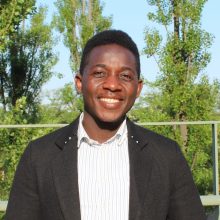
——You have joined all the online programs we have planned last year. It seems like Meditation online tour was especially impressive for you. You taught me you have learned in the peacebuilding class at PIASS that meditation is effective in the treatment of PTSD, and that was why you wanted to experience Meditation Online Tour. How did you find it?
First, it was my first opportunity to practice meditation with a professional monk, at least I learned some tips on how to start meditation and for how long one can meditate. I realised, meditation can be used in healing some psycho-social mental problems such as stress, anxiety, poor sleep and depression. For instance, during meditation I concentrated my thoughts on one thing and after I felt refreshed with the peace of mind. As a student of peace and conflict, I found meditation a very important aspect which can be contextualised in PCS and be used through trauma healing. I hope, after the convid-19 pandemic, we shall have a chase to attend meditation practice more physically than online.
——You have joined the Joint conference. How did you find it?
I was very glad to be among the members who met to discuss the future of the ISEP-TUFS students which aimed at fostering TUFS Partnership with other African Universities. Through the IAfP online tours or conferences, I have realized how TUFS is passionate at building more connections and cooperations with several Universities in Africa. These partnerships help us as students to learn from a culturally diverse community which later on enhance our social interactions, knowledge sharing, communications skills and reduce some stereotypes that we as students may have before.
——You have joined all the online programs we have conducted last year. How was it?
First of all, it was a great opportunity to be among the first beneficiaries of the IAfP. This program gave me the opportunities to participate in Japanese class, several tours (Hiroshima, Meditation and Okinawa) and the Joint Conference with African universities. I learnt a lot through these sessions, some maybe seen in the following. In the Japanese classes, I got a chance to practice and learn how to introduce myself in Japanese, how to ask for directions, how to order meals and how to explain my symptoms to the doctor for the first time. Importantly, during these challenging days of pandemic, these tours helped me to get more chances to interact with different people and made more friends both in African and in japan.
——Please give a message to TUFS students.
I would like to encourage the TUFS students who are interested in making international friendships, culture exchange, improving communication skills, language practice and research about the international arena (Africa), to join all the tours organized by the IAfP which is a new program at TUFS. Through these programs, the students will be able to learn a lot.
First, they can make more international friendships since the participants in these programs come from different countries. Second the students will be able to learn and interact with students from different cultures which will enhance their knowledge of diversity. Third, the students will get a chance to learn and practice their major languages such as English, French and Japanese through interactions or making friendships with native speakers of these languages, this will improve their language proficiency and restore their confidence while communicating with new people. Last but not the least, students can build their connection with other international students who can help them in carrying out their research depending on the nature of their research topics and area of interest (Africa). This can make it easy for students to get basic knowledge about their topic of interest compared to reading a whole book to understand simple things which could be done by just discussing with fellow students from their countries of interest (Africa). Thus, TUFS students shouldn’t miss this chance to learn by attending different tours organized by the IAfP.
——Please give a message to future candidates in Africa, who might be coming to Japan or participating in the online program of the IAfP.
I’m glad that the future exchange students from Africa will come when the IAfP has been established at TUFS too. Based on my personal experience as the first beneficiary of this program, I would directly encourage and recommend any exchange student (Africa) at TUFS to utilize the presence and the services offered by this program. This program organised different online programs such as Japanese classes, Joint Conference, Online Tours (Hiroshima, Meditation and Okinawa) which academically and socially helped me during my stay at TUFS as an exchange student, 2020-2021. This programme organised the elementary Japanese class to African students at TUFS (ISEP, Masters, Phd students) which helped me to learn some Japanese words and how to do certain activities in Japanese. The good thing with these classes, they are instructed in both English and Japanese which made it easy for me to understand. Actually I made more African and Japanese friends by attending this class. Furthermore, by attending the Hiroshima tour, I learnt a lot about how life was like in Hiroshima before, during and after the 1939-45 world war 2. Needless to mention that, by attending the mediation tour, I learnt a lot about its origin, its importance and how to meditate. Lastly but not the least, it’s important to mention that, by attending these tours, African exchange students at TUFS can easily learn Japanese, make international friends, learn some cultures and improve their communication skills. Furthermore, they can get exposed to the program coordinator (Chihiro Kumashiro sensei) who is friendly, kind and always ready to offer free guidance on how to apply for certain requirements at TUFS and in Japan at large. Actually, it’s worth mentioning that this program offered me the certificate of attendance at the end of the tours and the bicycle which I used up to the end of my academic program at TUFS and of which shall be inherited by other ISEP students (Africa). Therefore, I gladly recommend any exchange student (Africa) at TUFS to actively participate in all the tours and conferences organised by the IAfP.
IWAMOTO Sayaka
School of International and Area Studies, Filipino major, 4th year
Participated in Japanese class and Okinawa online tour
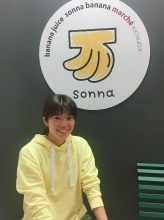
——Thank you for participating in all 6 classes of beginner and intermediate Japanese classes! First of all, please tell me your impression of participating in the Japanese class.
It was a valuable opportunity to interact with foreign students especially because I was at home during the winter semester. I enjoyed it! It was easier to participate online because my home is far from the university. I would like to participate again if there will be the same kind of opportunity again.
——We used Zoom breakout sessions to make you talk with international students one-on-one or one-on-two. How did you like it?
In the breakout session, we were able to communicate with a small number of people, and it was good that we got to know each other well. I was happy that the international students actively used Japanese to ask me questions. Also, when it was difficult to communicate with each other, we could use English and letters, so there were no major difficulties. It was good that I could exchange fixed phrases and free conversation in a good balance. I think it was a valuable opportunity to interact with international students. In addition, I think that I could also learn English.
——I felt that more and more exchanges were made and the conversation went deeper among the international students and volunteer students as the classes went on. You also participated in the Okinawa online tour. How was it?
At the Okinawa online tour I could learn and think about the war in Okinawa. I once again felt that the war left deep scars even until today. It was my first time to go on an online tour, so it was fresh and interesting. It was also my impression that the content was a little heavy. Online tours sound like fun, so I thought if there were a little more fun content and activities (like listening to folk songs and visiting a traditional confectionery factory and so on), participants would be able to learn about another side of Okinawa.
——Thank you for your comments and suggestions! We will plan this year’s program by referring to your opinions. Finally, please send a message to the current students.
I heard about this program from a professor of my seminar and I participated in it because I was interested in it. I think that it is attractive to be able to interact with foreign students while staying at home even during the COVID-19 and to help their study in Japan. I would be happy if as many students as possible will be interested in this program through this article.
I would like to meet the international students on campus in the near future!
HAGIHARA Saki
School of International and Area Studies, African studies major, Graduate in March 2021
Online tour working group (WG) member
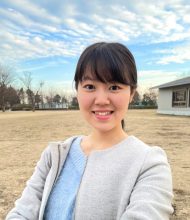
——What did you enjoy the most as a member of WG?
The time I felt glad to participate in the WG was when I saw and heard the reactions of the international students after listening to the stories of an atomic bomb survivor during the Hiroshima tour. At first, I was worried about how international students would feel about dealing with the big and heavy theme of Hiroshima. However, after the tour, when an international student who had actually experienced a conflict said that “I felt I want to share some of my experiences that I didn’t want to talk about until now”, I felt the significance of holding such a tour. I also enjoyed sharing ideas in the WG to make a better tour and all the conversations we had at the meetings. I like the discussions when creating an event, and the small number of the WG made it easier for me to express my opinion, so I was able to participate more actively. Also I was able to have a serious debate on the theme of war with international students, which was a very valuable experience and I could learn a lot of new ways of thinking.
——Have you had any difficulties as a working group?
The words of an international student after the Okinawa tour made me feel sorry. He participated in both the Hiroshima and Okinawa tours and said “I was fine in Hiroshima tour, but I had a hard time in Okinawa tour”. The WG held both tours with a common aim to make opportunities for the international students know more about the history of Japan, but I felt that participants’ feelings differed according to the content, even though those two online tours had the same theme. I thought that we need to take a hard look at the causes of difference and think about the best way to deliver a message, because if we didn’t do so, we would repeat the same thing again. For those reasons, I felt that it is necessary to take time to discuss the good points, improvement points and characteristics of the Okinawa and the Hiroshima tour. (If I were a student and still studying this year at TUFS, I would have wanted to do it during the spring semester.)
——Lastly, please give your thoughts and message to the current students!
It was a great opportunity that I was able to work as a member of the WG during the last spring vacation of my fourth year at TUFS. There were several meetings before the Hiroshima and Okinawa tours were held, and I was able to interact with the members of the WG, which was a very good time. I hope this tour will continue after this year and become an annual event of TUFS. You can learn a lot from the experiences, so please participate in the WG and the online programs of IAfP!
TOYOSAKA Takehisa
Graduate School of Global Studies, Global Studies, 2nd Year of Master’s Program Student
Participated in Japanese class, Member of the Online tour working group (WG)
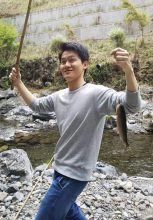
——You have volunteered in Japanese class and online tour WG. How was being a member of the WG?
It was very interesting to learn about Japan with participants from various backgrounds. Especially about the Okinawa tour, I guess there are few people in Japan who don’t know about the Battle of Okinawa or the U.S. Military bases issue, but there were many international students who knew about it for the first time, so I felt it was interesting. On the other hand, I was surprised that international students studying peace and conflict studies had more knowledge about Hiroshima and Okinawa than Japanese students.
——Have you had any difficulties working as a WG?
As they were online tours, it was hard to have a sense of reality, so I felt that this passive learning is maybe the problem we have to solve. However, students could participate actively in quizzes, meditation experiences, group work and other activities that the tour organizers proposed. In the midst of the ongoing COVID-19, I believe that online programs will continue in the future, so I hope that we can take advantage of this situation to create meaningful opportunities for learning.
——Lastly, please give a message to current students!
I think the online program of IAfP gives valuable chances because there are few opportunities for international exchange due to the corona related crisis. For those who like to discuss, those who want to try international exchange, those who want to practice English, please participate in the future IAfP programs!
Comment from UCHIMURA Shuntaro
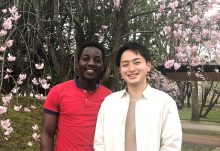
School of International and Area Studies, African studies major, Graduate in March 2021
Participated in Japanese class and Online tour working group (WG) member
I participated in a Japanese language study and THE WG just before graduating from university. I was interested in how foreign students view the wars in Hiroshima and Okinawa. The point of view of the foreign students was based on their own experience of conflicts and refugee lives, and with surprise, they overturned my common sense. Therefore, we need to pay attention to sensitive themes such as war, but I have learned a lot including this kind of imagination.
There are many foreign students in the university, but in order to actually interact with them on a daily level, I think you need to make an effort by yourself. Helping them learn Japanese or participating in the WG is also a way. I was able to meet them face to face and keep in touch after this online event. The encounter with foreign students leads to the career path after graduation.
I hope that the actual TUFS students will grasp the chance so much that the graduates will envy. I’m cheering for you!
Comments from the professors of IAfP working group
Here is a comment from professors involved in the project to the students regarding the actual travel of exchange and the online program of IAfP.
Professor TAKEUCHI Shinichi
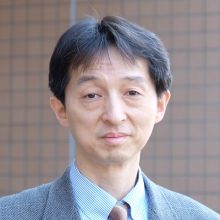
In Africa, you have to think and act by yourself. It is because various systems and facilities are not meticulously arranged like Japan. But don’t worry. If you’re in trouble, you’ll certainly encounter someone who will help you. Studying in Africa is a valuable opportunity for students to acquire the strength to make your own path and to feel trust in others. It will surely change your life.
Associate Professor SAKAI Makiko
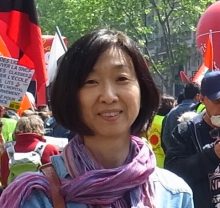
IAfP supports the mutual exchange of students of Japan and Africa, which one feels hesitant to do, in various ways. There is no place as diverse and vast as Africa that can shake your existing values. First of all, why don’t you experience Africa through the online classes connected with African universities and online programs with exchange students provided by this project? The image of “I want to go to Africa but it is a ‘distant place’” will surely change.
Associate Professor OISHI Takanori
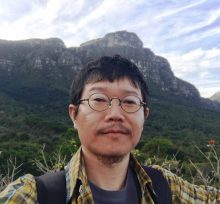
For the past 20 years, I have been researching in two countries, Cameroon and the Republic of Congo, but since I was assigned to TUFS, I have learned a lot about Africa through the various experiences of the students who have participated in the exchange program with African universities. When they study in Africa, they often jump out from the campus and take on various “derailments” such as apprenticeship, entrepreneurship, fieldwork, internships and volunteers to broaden their way of viewing and engaging world. I am excited to see what kind of new challenge will come out from the participants of IAfP program.
For those who want to know more about IAfP
The following official website provides an overview of this project, including a detailed report about online programs of last year. We will keep you informed of the future programs planned this year and after. Please check it out!
http://www.tufs.ac.jp/iafp/en/
If you have any questions or concerns about IAfP, studying abroad in Africa, online programs, or Africa, you are always welcome to contact us.
IAfP office
Research and Lecture Building #401E3
Contacts:tenkai-africa-coordinator(at)tufs.ac.jp
※ Please replace (at) with @.

